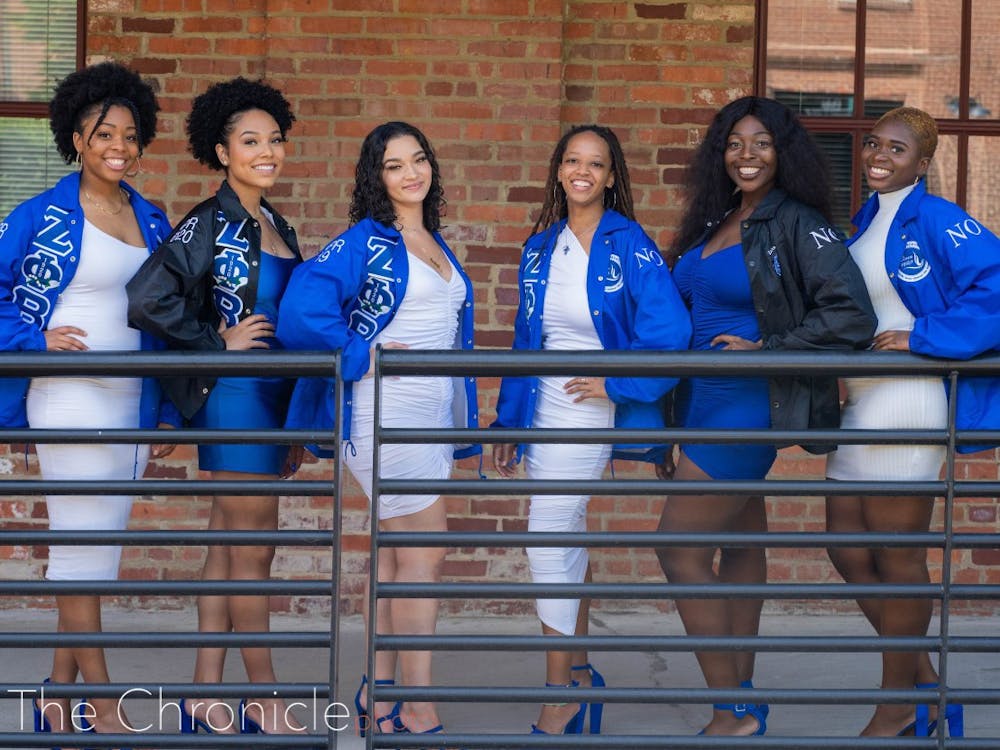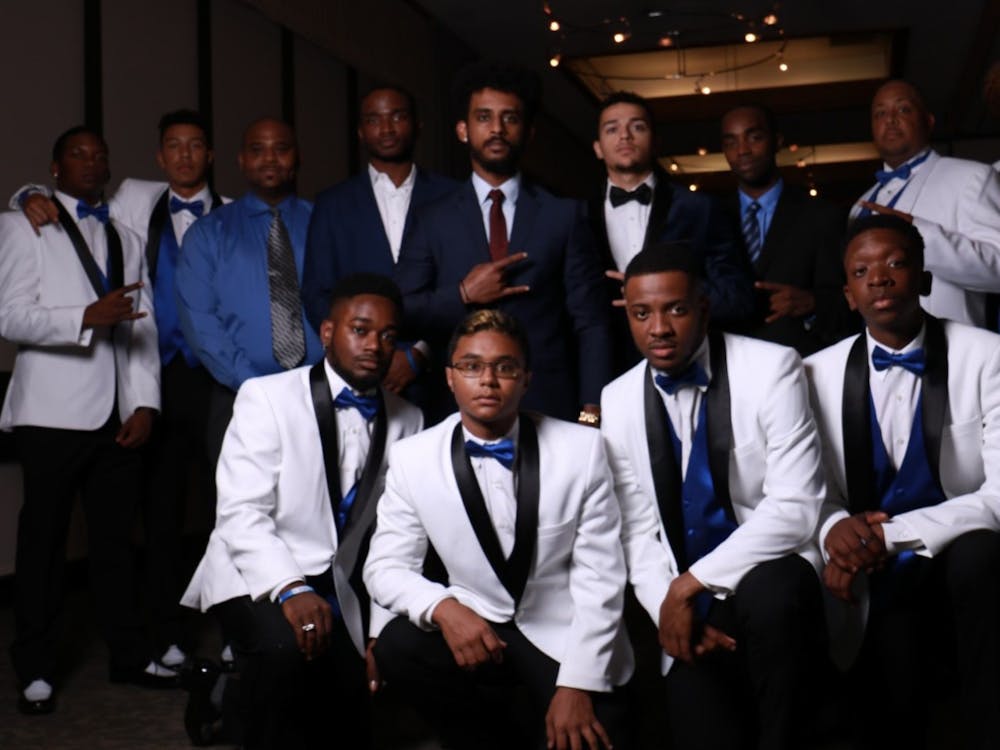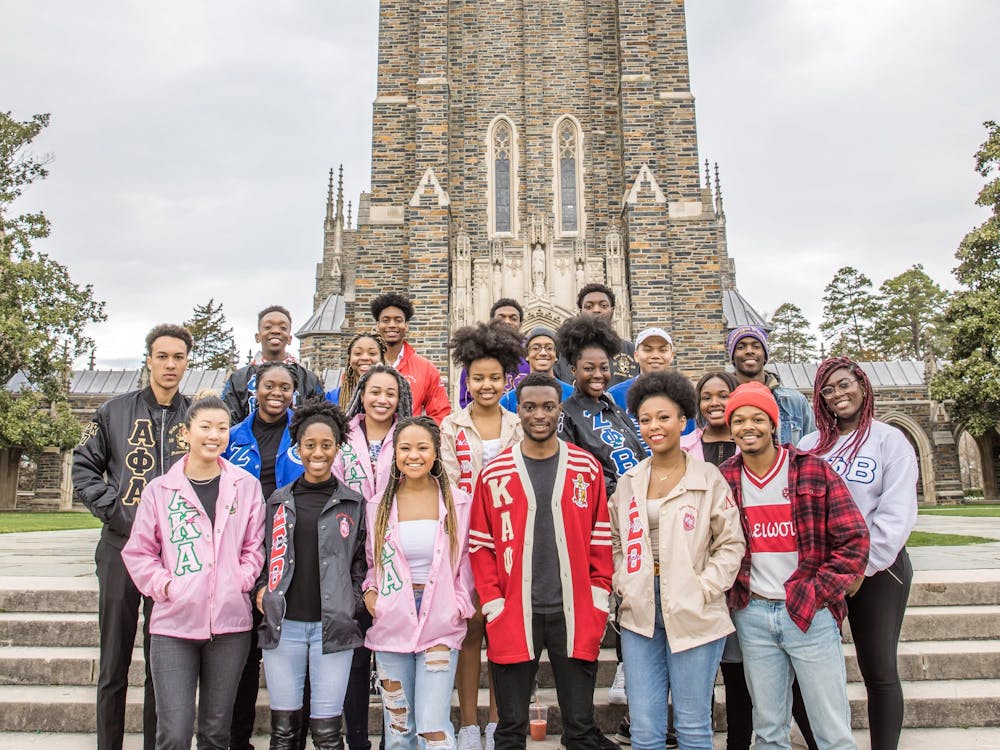Traditionally excluded from Duke’s predominantly white fraternities and sororities, it wasn’t until 11 years after being admitted on campus that Black students could find social outlets in the University’s Greek life scene.
Duke’s first class of Black undergraduates—composed of five students—enrolled in September 1963, following the University’s desegregation March 8, 1961. Despite official desegregation, Black students faced innumerable difficulties integrating into the historically white university.
Former Dean of Students Sue Wasiolek, who is now associate vice president for student affairs and senior advisor, told The Chronicle that membership and leadership opportunities in Greek organizations were “at best limited” for Black students on campus. Wasiolek, who was an undergraduate student when the first Black Greek organizations were formed on campus, said that the National Panhellenic Conference and the Interfraternity Council were “distinctively white organizations.”
Theodore Segal, Trinity ‘77, writes in his book, “Point of Reckoning: The Fight for Racial Justice at Duke University,” that in 1963, 11 fraternities and two sororities on campus had clauses in their national constitutions that barred Black students from joining. Organizations without explicit anti-Black membership policies excluded Black members by requiring pledges to obtain a “hometown” or alumni recommendation to join or requiring the national chapter to approve each member, he wrote.
In 1966, Duke President Douglas Knight ordered all fraternities and sororities to eliminate racial and religious restrictions to membership and to sign a nondiscrimination pledge. Knight’s mandate followed the federal government’s 1965 declaration that fraternities and sororities could not “discriminate on racial grounds.” Despite this policy, Greek Life initially remained predominantly white and change came slowly, according to Wasiolek.
Black Greek organizations form on campus
Eight years after Knight’s order, the first historically Black fraternity was chartered on Duke’s campus in 1974. The next year, the first two historically Black sororities were chartered at Duke.
Maureen Cullins, director of the Multicultural Resource Center at the School of Medicine and one of the founding members of the Iota Mu chapter of Alpha Kappa Alpha Sorority, Duke’s second chartered Black sorority, told an undergraduate researcher there was a need for more Black leadership opportunities and organizations that met the needs of the Black women on campus.
Wasiolek noted that until the National Pan-Hellenic Council was formed on campus in 1995, all Greek organizations, regardless of whether they were historically white or Black, were members of the NPC and IFC. This arrangement, she said, was “not as productive” and “not as supportive” as it could have been for Black Greek organizations.
“It was an awkward, and I would say, significantly non-beneficial affiliation for Black Greek organizations in the IFC and NPC, because number one, it didn't align to how they were structured and how their membership was structured nationally, nor did the rules, regulations and the traditions of the IFC and NPC groups really apply to the NPHC groups,” Wasiolek said.
Most notably, Wasiolek added, Black Greek organizations were considered “associate members” of the NPC and IFC and thus didn’t have full voting privileges.
Wasiolek, who joined Duke Student Affairs staff nearly 40 years ago, said that at the time, without the NPHC as an umbrella organization, the best way that she and the administration knew to support the Black Greek organizations was to “meet with them, to be there for them, to try to get to know them, answer questions and support them through any challenges that they might have.”
The National Pan-Hellenic Council, the national coordinating body of the nine historically Black sororities and fraternities, was formed on Duke’s campus in spring 1995. Its formation allowed Black Greek organizations at Duke to benefit from national guidance and develop further credibility on campus.
Duke’s NPHC chapters were founded between April 1974 and October 1993. Their national chapters were founded in the early 1900s, several at Howard University, a historically Black university.
“Black people as a whole didn’t really have access to higher education in general and especially not upper echelon things like Greek life, so the people who founded these organizations and continue to be in them are much more focused on redistributing that privilege, that knowledge, that information, wealth, resources, facts, to communities who don’t have it,” said Gia Cummings, member of the Iota Mu chapter of Alpha Kappa Alpha, Inc.
Learn more about the history of each of Duke's NPHC chapters:
Wasiolek added that when she was part of Student Affairs in the 1980s, 1990s and even into the 2000s, there were “quite a few challenges that presented to the Black Greek organizations.”
One of those challenges, she said, was that the groups have always been relatively small. As a result, whenever groups hosted social functions, fundraisers, step shows or strolls, it was important for them to invite chapters from neighboring universities, which was “not something we encouraged groups to do,” due to potential security issues, Wasiolek said.
Although the regulation was applied to all student organizations on campus, Wasiolek said that it “had a different impact on the Black Greek organizations than it did on the predominantly white ones.”
“There was a lot of work over the years in trying to figure out how to support the Black Greek organizations so that they could have successful, fun and safe events while at the same time, inviting folks who were not necessarily members of the Duke community who may not understand all of the expectations of being on the campus,” she said.
Duke’s NPHC today
The NPHC is currently in a transition period, said NPHC President Nurah Koney-Laryea, a senior and member of Duke’s Lambda Omega chapter of the Delta Sigma Theta Sorority, Inc. She and others recognized that this year was a time to “fix and mend the community” by looking at past issues and working to fix them.
“This year with NPHC there has been a lot of internal discussion about ways we can bring together the Black community at Duke,” Koney-Laryea said.
So far, these changes have included more inclusivity training and increasing awareness about the Black LGBTQIA+ community that exists at Duke. “There is more programming focused on uplifting LGBT voices,” Koney-Laryea said. “Being part of the queer and trans community is not separate from being a Black person.”
Now, all NPHC members must attend at least one training from the Center for Sexual and Gender Diversity, and each meeting of the NPHC general body includes direct questioning of chapters about how they are making an effort to be more inclusive.
NPHC has roughly 50 members at Duke, Koney-Laryea said, and nine different chapters nationally. Those chapters are commonly referred to as the “Divine Nine,” or D9. Eight chapters are chartered at the University.
After assuming the NPHC presidency in April, Koney-Laryea had to adapt the organization to virtual activities. She said that through activities like a virtual scavenger hunt earlier in the semester, the group has been making the most of Zoom by organizing meaningful interaction that builds community.
After this summer’s nationwide racial reckoning, NPHC chapters had a meeting to discuss racism on Duke’s campus and how everyone could work to improve the community, Koney-Laryea said.
“It’s draining to talk about all the time,” Koney-Laryea said. “Race has always played a component in how we carry out our events, how we do our community service.”
Senior Tobi Akinyelu, a member of the Kappa Omicron chapter of Alpha Phi Alpha Fraternity, Inc., said that his involvement in the chapter has been eye-opening for him.
“NPHC is at the forefront of initiatives to change the perception of people against the Black community and to build excellence and support people who are struggling. It does so much for our community,” Akinyelu said.

Members of the Nu Omicron chapter of the Zeta Phi Beta Sorority, Inc., pictured before the COVID-19 pandemic.
Junior Debora Cordero Martinez, public relations chair of the Nu Omicron chapter of the Zeta Phi Beta Sorority, Inc. said that culturally, NPHC organizations are “very, very important to the Black community.”
“There’s just so much history behind it. It goes deep, so that’s why you will see a lot of love, people showing up for it and a lot of pride. Membership for our organizations is lifelong,” she said.
Building a community and giving back
All of the D9 organizations have similar core principles of scholarship, service, brotherhood or sisterhood, said Cordero Martinez. However, each organization has unique initiatives, particularly when it comes to community service.
Zeta Phi Beta, for example, runs the Adopt-A-School initiative, where members supply resources or volunteer hours to support students and faculty at local schools. Even with the restrictions imposed by COVID-19, Cordero Martinez said that her chapter is still finding ways to give back to the Durham community.
Cordero Martinez specifically appreciates her chapter’s dedication to activism, being present and “showing up” for causes that members care about. This summer, the chapter did a fundraiser for the GoFundMes for Ahmaud Arbery and Breonna Taylor, she said.
She also noted that her chapter doesn’t shy away from discussing difficult issues.
“Even just making safe spaces, or hosting events to talk about important subjects. We usually do a sex, love, dating event, which is talking about some of the more taboo topics,” Cordero Martinez said. “We’re not scared to talk about issues. We're present, we're there. I just love our chapter for that.”
Cordero Martinez, an only child, said that the bonds she has formed with her chapter have been deep and sisterly. “Those are my sisters. And with the members of our brother fraternity, [Phi Beta Sigma], those are my brothers,” she said.
Akinyelu echoed Cordero Martinez’s thoughts. As the oldest of three children, Akinyelu never had a big brother figure or mentor to help guide him through life’s challenges.
“That’s what Alpha was for me,” he said. “A group of guys focused on making you the most successful you can be. It’s iron sharpening iron.”
As a first-generation college student, Akinyelu didn’t know what to expect when he arrived on Duke’s campus. In Alpha Phi Alpha, he found a group of young men focused on helping each other succeed and positively impacting society.
“I wouldn’t be where I am today without this brotherhood,” Akinyelu said. “Alpha embodies excellence in a very crucial way.”
As an example of his organization’s commitment to bettering society, Akinyelu noted that Alpha Phi Alpha established the Go-to-High-School, Go-to-College program. The organization is focused on encouraging high school and middle school students to complete their high school educations and attend college. “It’s an organization that teaches you how to pay it forward,” Akinyelu said.
Gia Cummings has been a member of the Iota Mu chapter of Alpha Kappa Alpha, Inc. since her sophomore spring. She said that through the organization, she has found opportunities for meaningful community service and personal growth.
“It’s been really transformative in helping me find my place at Duke. Before I came to college I think I was a lot more uncomfortable with being a Black woman and owning that proudly and I think being a member of [Iota Mu] has helped me embrace that and proudly be bold about my identity and my opinions, and restructure my life in a way that is not trying to hide my identity but celebrate it,” Cummings said.
As this year’s community service chair, Cummings said that she has worked to find ways to engage in meaningful service without sacrificing health or safety. Iota Mu’s service is particularly focused on women and girls in the Black community, she said.
Community service is a central theme for all NPHC chapters.
“Traditionally when people think about fraternities or sororities the social aspect is the first thing that comes to mind,” said senior Miles Underwood, a member of the Iota Xi Chapter of Kappa Alpha Psi Fraternity, Inc.. “When NPHC was born and the first organizations were brought into existence, it was with the purpose of serving communities.”
Setting Black students up for success
Senior Tyler Johnson, social action co-chair of the Lambda Omega chapter of the Delta Sigma Theta Sorority Inc., said she has always been drawn to the sorority’s core values and dedication to providing opportunities for its members to build connections that will be beneficial throughout their lives.
“I knew coming into Duke that I was interested in becoming a Delta,” Johnson said. “It was hearing people talk about signature events that we've had … just seeing the love that individuals have for the chapter itself—it really is a life-lasting bond—seeing how alumnae would come back and how they always had somewhere to go when they were on Duke's campus.”
One of these signature events is the Black faculty mixer, in which undergraduates bond with faculty, graduate students and administrators of color at Duke to build connections, seek advice and find mentorship. The goal is to set Black students up for success.
“Since we are in a minority at Duke, it can be tough when you go in classrooms, and you never see someone that looks like you. And that is often the case for us,” Johnson said.
Johnson added that doing service initiatives with her chapter has also given her a chance to broaden her interaction with the Durham community. This year, they have transferred all programming online, holding the Black faculty mixer and a breast cancer awareness event online last semester, for example.

Members of the Alpha Alpha Chi chapter of Phi Beta Sigma Fraternity, Inc., pictured before the COVID-19 pandemic.
Junior John Modarres, president of the Alpha Alpha Chi chapter of Phi Beta Sigma Fraternity, Inc., said that when he first joined, there were only five members in the chapter but he was impressed by how “just five people could make such a big impact. They’re always doing service, they’re always having events.”
He recalled that the first event he attended was AAExcellence, where alumni from the Alpha Alpha Chi chapter came to campus from all across the country to talk about their careers and life paths. He said that he was struck by how strongly the chapter’s members and alumni embodied the organization’s guiding principles of success and excellence.
Moddares said that he also was impressed by the dedication of alumni to the chapter. “Some of them weren't even staying in the area, and they flew from wherever they're living just to give this talk.”
AAExcellence is part of Bigger and Better Business, a national campaign by Phi Beta Sigma that aims to promote success in Black business and good business practice in personal life.
Underwood said that being part of the Iota Xi chapter of Kappa Alpha Psi since his first year at Duke has been instrumental to his college experience.
“I’ve been a Kappa longer than I haven’t been a Kappa,” he said.
The Iota Xi chapter is now celebrating its 42nd year on campus. While fairly small, the organization is committed to its mission of “achievement in every field of human endeavor,” Underwood said.
“Having access to such an immense and successful alumni network along with having access to men you can call your brothers who are always going to be there to push you,” Underwood said.
Underwood, a public policy major going into private equity after graduation, credits his fraternity with helping him to figure out his career path and secure many of the opportunities he has found throughout college.
“We’ve been given this opportunity to go to an institution like Duke, and that in itself is a very powerful opportunity,” Underwood said. “If you’re going into finance, how are you going to create a new economic base for Black communities? If you’re going into tech, how are you going to teach little Black kids how to code? Regardless of what career you go into, always remember you didn’t get there on your own. Always reach back to the community and support them.”
Get The Chronicle straight to your inbox
Signup for our weekly newsletter. Cancel at any time.

Mona Tong is a Trinity senior and director of diversity, equity and inclusion analytics for The Chronicle's 117th volume. She was previously news editor for Volume 116.

Maria Morrison is a Trinity senior and a digital strategy director for The Chronicle's 117th volume. She was previously managing editor for Volume 116.

